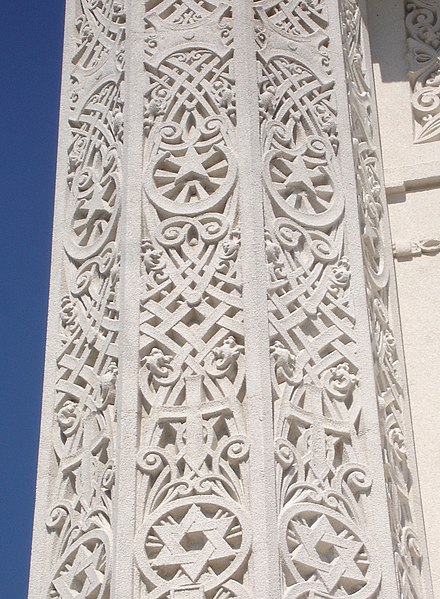Universalism is the philosophical and theological concept that some ideas have universal application or applicability.
Symbols of many religions on a pillar of the Baháʼí House of Worship in Wilmette, Illinois
The first use of the term "Catholic Church" (literally meaning "universal church") was by the church father Saint Ignatius of Antioch in his Letter to the Smyrnaeans (circa 100 AD).
Sefer Torah at old Glockengasse Synagogue (reconstruction), Cologne
Sign on a UU church in Rochester, Minnesota, United States
Taoism or Daoism is a diverse tradition indigenous to China, variously characterized as both a philosophy and a religion. Taoism emphasizes living in harmony with the Tao—generally understood as being the impersonal, enigmatic process of transformation ultimately underlying reality. The concept originates in the Chinese word 道, which has numerous related meanings: possible English translations include 'way', 'road', and 'technique'. Taoist thought has informed the development of various practices within the Taoist tradition and beyond, including forms of meditation, astrology, qigong, feng shui, and internal alchemy. A common goal of Taoist practice is self-cultivation resulting in a deeper appreciation of the Tao, and thus a more harmonious existence. There are different formulations of Taoist ethics, but there is generally emphasis on virtues such as effortless action, naturalness or spontaneity, simplicity, and the three treasures of compassion, frugality, and humility. Many Taoist terms lack simple definitions and have been translated in several different ways.

Laozi Riding an Ox by Zhang Lu (c. 1464–1538)
Illustration of "The Debate on the Joy of Fish" from the Zhuangzi
Han dynasty Chinese talisman, part of the Wucheng Bamboo-slips [zh]
Zhang Daoling, the first Celestial Master







![Han dynasty Chinese talisman, part of the Wucheng Bamboo-slips [zh]](https://upload.wikimedia.org/wikipedia/commons/thumb/8/8d/Chinese_Fulu_talisman_han_dynasty_%E4%B9%8C%E7%A8%8B%E6%B1%89%E7%AE%80%E6%B5%99%E6%B1%9F%E5%87%BA%E5%9C%9F.jpg/441px-Chinese_Fulu_talisman_han_dynasty_%E4%B9%8C%E7%A8%8B%E6%B1%89%E7%AE%80%E6%B5%99%E6%B1%9F%E5%87%BA%E5%9C%9F.jpg)
